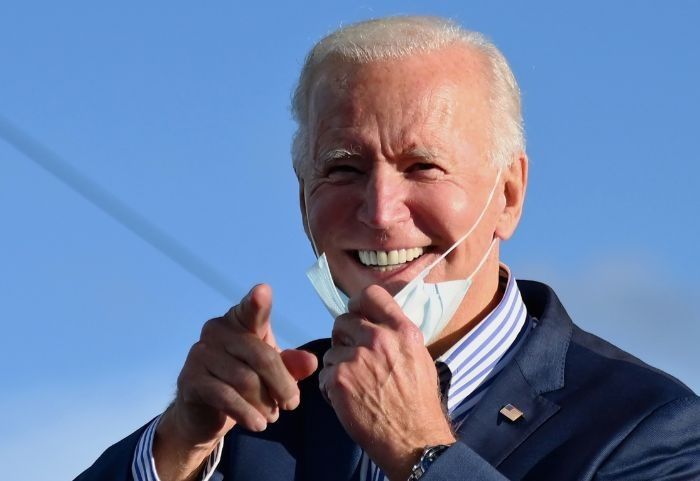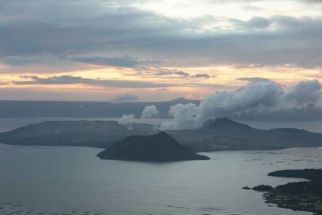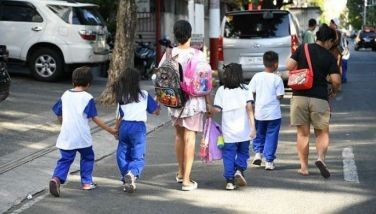Explainer: What can the Philippines expect from a Biden presidency?

MANILA, Philippines — The United States, longtime ally and former colonizer to the Philippines, has elected Joseph R. Biden Jr. its next president, and if his campaign promises are to be believed, Manila will find itself dealing with a radically changed Washington next year.
After four long days of ballot counting, the Democratic challenger early Sunday morning (Manila time) garnered more than the 270 electoral votes needed to clinch the race, rendering Incumbent Donald Trump the first president denied a second term by Americans in almost three decades.
Having triumphed against a chaotic presidency which left many traditional American allies out in the cold, President-elect Biden is now tasked with fulfilling his campaign promise "to restore dignified leadership at home and respected leadership on the world stage."
Here's what the Philippines can expect from a Biden presidency come January 2021.
'Summit for Democracy'
On his official campaign website, Biden commits to "bring together the world’s democracies," within his first year in office, "to strengthen our democratic institutions, honestly confront the challenge of nations that are backsliding, and forge a common agenda to address threats to our common value."
This "Summit for Democracy," which the US would organize and host, seeks new commitments from nations in these three areas:
- fighting corruption
- defending against authoritarianism, including election security
- advancing human rights in their own nations and abroad
Experts have flagged this push for democracy as one that is likely to cause friction with the Philippines — a nation which boasts a populist leader with a reputation in the international community for snuffing out human rights.
If a Biden administration were to raise the subject of human rights with the Philippines, the country's envoy to the US Jose Manuel Romualdez has already signaled that Manila will continue to assert its sovereignty. "[T]he bottomline message here...is that we are a sovereign nation," he said in an interview ABS-CBN's "Headstart" this week.
Biden's push to "revitalize" democracies across the globe, however, will not be limited to the issues outlined above.
Jake Sullivan, senior policy advisor to Biden, in an interview with Crooked Media's podcast "Missing America" last month, said that while a Summit for Democracy would serve as "a strong signal value" in defense of democratic perspectives, institutions and models, it is also an effort to "take a hard look at how we can refurbish and rehabilitate [democracy] in important ways."
For Biden, Sullivan said, the summit would serve as a "practical forum to solve very real world problems."
"It also goes for very tangible issues like how do we deal with technology? How do we deal with issues related to trade and international economic policy? Corporate concentration?" Sullivan said.
"How do we deal with the fact that we've got young people who look at democratic systems and worry that they're just not up to the job of the great challenges of our future, whether its climate change or racism or what have you."
According to Biden, civil society organizations across the globe who work to defend democracies will be invited to participate in the summit alongside democratic nations.
"The Summit will also issue a Call to Action for the private sector, including technology corporations and social media giants, to make their own commitments, recognizing their responsibilities and their overwhelming interest in preserving open, democratic societies and protecting free speech," the former vice president adds.
The same summit of democracies, Biden's foreign policy platform outlines, will call on technology companies to "make concrete pledges" on ways to ensure their algorithms and platforms will cease from doing the following:
- enabling surveillance states
- facilitating repression "in China and elsewhere"
- spreading hate and spurring people to violence
- remaining susceptible to misuse
Climate change
"Donald Trump's climate denialism affects my island country and the rest of the world," anthropologist and columnist Gideon Lasco said on Twitter Wednesday, only a few days after cyclone Rolly, the strongest typhoon of the year, battered Southern Luzon.
He further urged Americans, who were still voting at the time, "to make the right choice," highlighting that Trump's "disdain for human rights" and "disgust for global cooperation" affects the Philippines too.
On Thursday, as America and the rest of the world anxiously awaited the result of the election, Trump's promise to withdraw from the Paris accord took effect, rendering the US the first country to ever withdraw from an international climate change pact.
After Trump announced in 2017 that he would leave the Paris agreement, environmentalists warned that countries such as Australia, Saudi Arabia and Brazil weakened their own climate ambitions.
Agence France-Presse this week reported that rich countries are failing to live up to a decade-old promise to ramp up climate financing to poorer nations who are historically blameless for global warming but are most at risk.
"[Biden] is going to work aggressively to establish development standards globally that build both climate carbon mitigation and allow for these developing countries to be able to adapt to the ravages of climate change which they're gonna face faster and greater than the rest of the world," his top advisor said.
For a Biden administration, Sullivan added, "rejoining Paris on day one is an absolute must but not enough."
He further outlined the Biden plan to address climate change in this way:
- Rejoining Paris and calling on other nations to "elevate their ambitions" under the agreement by increasing "commitments to mitigate carbon in their own countries," including China which is the "world's largest emitting country"
- Worldwide ban on fossil fuel subsidies
- "Dramatic breakthroughs on the technology side" to address climate change; scaling up the Obama administration's Mission Innovation which was "20 countries coming together around research, development, and deployment of breakthrough technologies"
- International trade rules that would compel trade deals to "build climate considerations into their core"
China
"The United States does need to get tough with China," Biden wrote in an essay for the March/April 2020 issue of Foreign Affairs, characterizing the superpower in the East as "the real economic threat" to America.
Biden's strategy to address the challenge presented by China is "to build a united front of U.S. allies and partners to confront China’s abusive behaviors and human rights violations."
However, the former vice president said, this would have to be balanced with the need to "cooperate with Beijing on issues...such as climate change, nonproliferation [of nuclear weapons], and global health security."
Trump's Secretary of State Mike Pompeo, often criticized in his own country as hawkish or prone to favor military solutions despite his position as chief diplomat, in 2019 vowed to support the Philippines in case of any armed attack by China in the South China Sea. It is unclear if a Biden administration would go as far as to promise the same.
However, members of Biden's foreign policy team have indicated that they would continue to recognize the Philippines' arbitral win against Beijing over the South China Sea, Ambassador Romualdez this week told CNN Philippines' "The Source."
Pompeo in July declared that the US would treat Beijing's claims to resources in the South China Sea as completely unlawful. Soon after that, Washington also announced sanctions against 24 Chinese state-owned firms involved in building artificial islands in the area.
International studies expert Renato De Castro told One News' "The Chiefs" on Wednesday that Biden would "be a more dangerous element" for China, citing the likelihood that Biden will improve relations with the North Atlantic Treaty Organization, the strongest military alliance in the world, which China is not party to.
"[C]hances are [Biden] would improve relationship with NATO, and NATO might be interested in coming into the Indo-Pacific so that would complicate matters for China," Renato, an international studies professor at De La Salle University said.
Trump previously threatened to withdraw from NATO, alleging on multiple occasions that other member states have fallen behind on their defense payments.
Biden in a July interview with Phoenix TV station KPNX said he would call up NATO allies on the first day of his presidency to renew America's commitment to the alliance.
A thread of major developments in the bilateral relations between the Philippines and the United States from April to December 2020. (Photo by AFP/Mark Cristino)
US national security adviser Robert O'Brien affirms Washington's commitment to the Philippines in protecting its sovereign rights, offshore resources and rights consistent with international law.
Citing Washington's realignment of its position on the South China Sea with the 2016 arbitral ruling that invalidate Beijing's expansive claims, O'Brien stresses that resources in the area belong to the Filipino people.
"They don’t belong to some other country that just because might, they may be big, and they may be bigger than the Philippines, they can come take away and convert the resources of the Philippine people," O'Brien says.
The US Embassy in the Philippines says the US government has turned over 150 laptop computers, printers, projectors and 80 sets of learning materials to the Department of Education through the United States Agency for International Development.
"This assistance is part of USAID’s Opportunity 2.0, a five-year, P1.9-billion ($37.5 million) project that works with DepEd, the Technical Education and Skills Development Authority, and local governments to support their ongoing programs to provide relevant education, employability skills, and work experience to out-of-school youth," the US Embassy says in a statement.
The US government launches a new program to provide second-chance opportunities to at least 180,000 out-of-school youth in the Philippines.
Under the five-year "Opportunity 2.0" project, which is worth P1.9 billion, the USAID will partner with DepEd and TESDA to augment their ongoing programs that provide relevant education, employability skills and work experience.
"Through this new partnership, we can leverage a range of resources to maximize the potential of the Filipino youth, particularly those who are out-of-school or unemployed. With the right knowledge, attitudes, and skills, they will play a pivotal role in this great country’s growth and success over the long-term," US Ambassador Sung Kim says.
US Secretary of State Mike Pompeo called Foreign Affairs Secretary Teodoro Locsin Jr. to discuss the recent change in US policy on maritime claims in the South China Sea, the US Department of State says.
The two foreign ministers also discussed US support for Southeast Asian coastal states upholding their sovereign rights and interests consistent with international law, as well as opportunities for further maritime cooperation between the two countries.
"The two secretaries also discussed the strong economic, security, and people-to-people ties that bind our two countries," the statement read.
The US Army and Marine Corps service members, in partnership with the Philippine Air Force, Army and Coast Guard, deliver an additional P11.4 million ($236,000) worth of personal protective equipment and medical supplies to hospitals in 11 cities in the Philippines.
The latest donation brings the total assistance of the US government to the Philippines' efforts against COVID-19 to P989 million (more than $20 million).
"This latest delivery of U.S. government assistance for Filipino frontliners in the battle against COVID-19 is a testament to our ongoing commitment to help the Philippines defeat the pandemic," US Ambassador Sung Kim says.
- Latest
- Trending






























